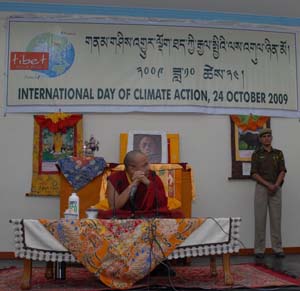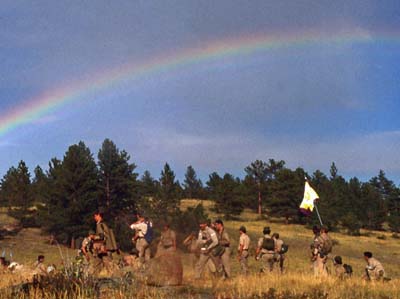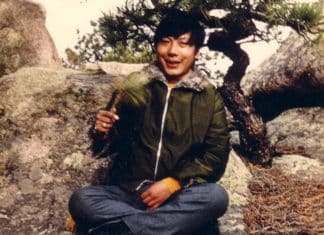On October 24th, the International Day of Climate Action, His Holiness Gyalwang Karmapa said that there are many ways for us to be kind and generous towards others.

“We as Buddhists believe that benefiting others is an act of kindness, and the first thing that comes to our mind, as act of kindness, is giving alms to the poor. That’s not the only way, there are many ways to be kind. Taking care of the environment and nature is also a very important act of kindness that can benefit many humans and animals alike in the future.”
His Holiness was speaking at a modest gathering at the McLeod Ganj Day School on the International Day of Climate Action – a special day that is being observed throughout the whole world. His Holiness inaugurated a signature drive on climate action by signing his signature on a giant piece of cloth.
His Holiness took the audience by surprise when he shifted his role from that of “chief guest” to that of “resource person” when he gave a PowerPoint presentation about the environment. The PowerPoint presentation was not on the organizers’ list of planned programming for the day. His Holiness said that every human being has a responsibility towards preserving nature and that we must act now if the fight against climate change and the destruction of the environment are going to be won.
“Human greed is unlimited and uncertain. We have wants for many things that we don’t even put to use. I heard most Tibetan families in the settlements have one or more motorcycles. We all know that we Tibetans like to follow the West. Many westerners go on long bicycle rides to places as far as Ladakh. So, why don’t we Tibetans get rid of our motorcycles and get bicycles?” His Holiness Karmapa said as he laughed away along with the audience.
The Environment and Development Desk of the Exile Tibetan Government, the Clean Upper Dharamsala Project of the Tibetan Settlement Office, and Tesi Environment Awareness Movement, jointly organized the day’s event. The event was attended, among others, by the deputy speaker of the Tibetan Parliament, members of the Tibetan Parliament and representative of the various institutes and organizations
Buddhist Declaration on Climate Change
HH Karmapa has signed the Buddhist Declaration on Climate Change. To join him please go to Ecobuddhism.org and click ‘Buddhist Declaration’.

![]() In the run-up to the crucial U.N. Climate Treaty Conference in Copenhagen in December 2009, the Declaration that follows will present to the world’s media a unique spiritual view of climate change and our urgent responsibility to address the solutions. It emerged from the contributions of over 20 Buddhist teachers of all traditions to the book A Buddhist Response to the Climate Emergency. The Time to Act is Now was composed as a pan-Buddhist statement by Zen teacher Dr. David Tetsuun Loy and senior Theravadin teacher Ven. Bhikkhu Bodhi with scientific input from Dr. John Stanley. The Dalai Lama was the first to sign this Declaration.
In the run-up to the crucial U.N. Climate Treaty Conference in Copenhagen in December 2009, the Declaration that follows will present to the world’s media a unique spiritual view of climate change and our urgent responsibility to address the solutions. It emerged from the contributions of over 20 Buddhist teachers of all traditions to the book A Buddhist Response to the Climate Emergency. The Time to Act is Now was composed as a pan-Buddhist statement by Zen teacher Dr. David Tetsuun Loy and senior Theravadin teacher Ven. Bhikkhu Bodhi with scientific input from Dr. John Stanley. The Dalai Lama was the first to sign this Declaration.
We humans have already done such immense damage to the environment that it is almost beyond our power to heal it. The challenge is far more complex and extensive than Buddhists can tackle alone. However, we can take a lead, and to do so we must educate and inform ourselves. This is the time when our pure aspirations and our bodhisattva activity must come together. This is the time to ensure a safe-climate future for our planet. This aspiration comes from my heart.
-Excerpt from HH Karmapa’s chapter in A Buddhist Response to the Climate Emergency (Wisdom Publications, May 2009).
![]() In March 2009, HH Karmapa convened the first Kagyu Conference on Environmental Protection at Saranath. During the conference the following list of practical guidelines was developed: 108 things you can do
In March 2009, HH Karmapa convened the first Kagyu Conference on Environmental Protection at Saranath. During the conference the following list of practical guidelines was developed: 108 things you can do
A call to contemplation and action from Sakyong Mipham Rinpoche
The Sakyong offered these teachings in support of Earth Day 2009, and the work of the Touching the Earth Working Group of the Sakyong’s Council. Issued by the Shambhala News Service, 20 April 2009.
Our precious planet and the innumerable beings who dwell here face an unprecedented crisis. The escalating threat to the world’s environment and climate stem from a profound predicament that affects all humanity. We are ever more rapidly losing our connection with the sacred nature of our world. This tragedy affects us in so many ways, but at its heart, it is a crisis of the spirit. We are harming our planet and fellow beings because we are losing touch with the basic goodness of our own sacred being.
This disconnect from our primordial basic goodness is amplified by unparalleled technological and industrial capacity, dramatic population growth, and the vast inequalities we witness everywhere in our world. Disastrous as this situation is, it is still possible to change course. The earth is calling to us for protection and for a return to basic sanity. We must all heed this call by adopting an approach that returns to a deep respect for our environment, and conserves our threatened resources.
We can take advantage of both traditional methods and innovative technological advances based on living in harmony with the fundamental intelligence of nature. But this global crisis cannot be transformed into a new way of living, if we rely on the same attitudes and habits that brought us to this terrifying brink in the first place. To do that would merely reinforce, despite our good intentions, the degradation and inequality that is already so widespread.
Welcome to this discussion page. Below is an open space for discussion, which Chris Keyser has agreed to facilitate, and a few posts from Buddhist teachers on the issues of climate change. Thank you to Chris for taking this on.
The Earth is Our Witness, by Chris Keyser
May every creature down to the smallest worm
Fall into samsara never more
For each and every one without a single one left out
May I be there to lead them on their way
-Jetsun Milarepa, Translated by Jim Scott
If we are unable to conceive of all sentient beings throughout limitless space, that’s not so important. But we live on this Earth, and everyone can see it. The Earth is in great danger and it needs our care, so we should try to help protect the environment for all the beings in the world. Even if we can’t do anything else, it is not too difficult to explain the basic things we need to do to protect the world. The more interest we take in learning about the environment, the more we will cherish and care for it.
-Orgyen Thinley Dorje, Gyalwang Karmapa XVII.
The buck’s soft black eyes held mine in a frozen gaze of terror as I fumbled with my ancient double reflex lens camera to capture his image before he bolted from sight. His eyes watering in fear pierced deep into my heart, stilling my clumsy hands. I put down the bulky camera, ashamed at what my human species had done to this noble creature, terrifying him for his life and safety. No one has the right to strike terror into the heart of another living being or place a bounty on their head and velvet antlers. That is bedrock – the fundamental Rule One for how to live in peace and harmony with all creatures upon our shared commons, our beautiful Earth home.
It was a bright autumn day 30 years ago, and the buck and I were alone in a quiet matchbook meadow next to the retreat cabin on Sugarloaf Mountain up Boulder Canyon near the Continental Divide. The golden aspens were aglow against the clear indigo sky. All around us gunshots rang out intermittently, proclaiming deer-hunting season. The retreat space provided a fleeting sanctuary from the violence and terror exploding all around us. –continue
Contradictions in environmental protection, from Howard Harawitz
Just about everything we hear about protecting the environment places the primary burden for that task on individuals and families. The experts and pundits tell us that the prescription for curing the earth’s ills is to reduce personal consumption as much as possible and to dispose of our own garbage in the least environmentally damaging way. Certainly, no one can dispute the wisdom of doing that.
But what do those instructions mean in a world where we are also told that the successful operation of our economy depends upon its constant growth and expansion? Manufacturing, mining and factory farming are by far the greatest consumers of the earth’s bounty and account for the greatest share of the pollution of our oceans, streams and soil. Yet, we are constantly reminded by political leaders, broadcasters, and, of course, advertisers, that the health of our society is measured by how much we consume and, therefore, requires that we keep on shopping.
Here in Nova Scotia my local supermarket no longer gives out plastic bags. Yet I can’t help but notice the wasteful packaging of just about everything that I put into my trendy reusable replacement. Moreover, thanks to the marketing efforts of global corporations, ever increasing numbers of people everywhere are on their way to consuming and polluting at a far greater rate than we in the “developed” world could have imagined only a few decades ago.
While there is every reason for each of us to be mindful of what we consume and what we throw away, isn’t it at least as important for us to begin to look into the root of the problem — a profit driven economic system that demands that we do just the opposite.
Howard Harawitz
Halifax
To my sangha, from Cheryl Foreman
I have been involved in the sustainability/ecology movements for 20 years. I have been fortunate enough to have worked with the Bioneers Convention for 12 years. During those years, I have been exposed to many pioneers and innovators from many different fields who have wisdom, devotion, and genuine caring to share with regard to the interconnected issues we have to face. If Shambhala International is interested in creating a sustainability mission, I would be glad to lend whatever resources I have. I would also be happy to share with people excerpts from the curriculum of a personal sustainability course that I project managed 4 years ago.
Yours in the phenomenal world of unceasing play.
Ecology Starts At Home, from Deborah Bright
Ecology starts at home, just like compassion. Every time we buy something with packaging, turn on an electric light or device, drive across town instead of walking, wash a load of barely used towels/clothes/sheets/whites/, throw away a piece of paper, we need to think about it and apply mindfulness to the process. My husband and I reuse, recycle, grow, and compost everything possible. But, for example, when I wanted to apply cypress mulch to my front flower garden for aesthetic purposes, Ben reminded me that it was “TRUCKED” to Oklahoma from Georgia. Not very sustainable. Can’t we make the biggest difference in global warming with “demand usage management”, i.e. conservation? Turn off the lights and get your schools, businesses and government to do the same. Buy bulk. Reuse, then recycle. Use the same towel for a week, Shambhala Mountain style! Walk, don’t drive. Compost. Plant food. Conserve water. Don’t flush so often. Skip a few showers (personal hygiene is highly over rated). Take a deep breath and don’t buy anything that comes in a box. Well, we have to start somewhere, it may as well be here.
Buddhists as Earth Protectors, from Susie Vincent
The poison of global warming due to the harnessing of machines in all places and times, Is causing the existing snow mountains to melt, And the oceans will consequently bring the world within reach of the aeon’s end. Grant your blessings that the world may be protected from these conditions! Kyabje Sakya Trizin Rinpoche
Thank you, Chris for opening this thread, and indeed, nothing in my view could be more relevant for our attention at this time. I’ve already posted bits of this letter as sangha-talk correspondence, but it has grown now. Your question covers serious social and economic problems as well as Earth-protection, and wish I could do justice to it.
I think my primary concern is: If Buddhists do not respond with insight and skilful means to protect the Earth and sentient beings – then who will?
Firstly, I feel we need to grasp that our house is on fire: the larger container for our lives and practice, the lives of all sentient beings, and the survival of species, is seriously at risk. It’s that important. Some – but certainly not all – earth scientists, believe that there is still time and scope to prevent the most unholy disaster and incredible suffering from pervading all the latter years of our own and our childrens’ lives, assuming that we survive. For many people and species, the disaster has already happened.
Second, to understand that not all adult Buddhists – including ourselves – may necessarily experience any deep sense of connection to people, element, tree or planet at all.
Ignore-ance is no excuse (said the Buddha!) There is nothing about non-attachment that implies separation – quite the opposite. We need to plant our bottoms firmly on the surface of the Earth, and re-cognize through the soles of our feet in walking meditations of all kinds that there is a very great deal more about us that is a part of all this than is apart from it. What’s happening here is happening to our ‘family’ in a very real sense, and if we lack this direct awareness, let’s ask why that is.
Robert Aitken Roshi
I had the pleasure of meeting with Joanna Macy recently. Joanna points out that we live in a world that can die. Whole species and life-support systems are already dying, and massive want, hunger, oppression, disease, and conflict assail a growing proportion of the planet’s beings. We can do something about it and yet we tend to act as if we don’t believe what is happening. She asks, “How can we become simply present to what is going on and let it become real to us Great adventures await us; what is it that erodes our will, our creativity, our solidarity” Joanna finds that many people (especially those drawn to Eastern paths) have developed notions about spirituality that hinder them from realizing their power to effect change. Among the ‘spiritual traps’ that cut the nerve of compassionate action are these:
That the phenomenal world of beings is not real. With this view the pain of others and the demands on us that are implicit in that pain are less tangible than the pleasures or aloofness we can find in transcending them.
That any pain we may experience in beholding the world derives from our own cravings and attachments. With this view, the ideal way to deal with suffering becomes nonattachment to the fate of all beings, not just nonattachment to matters of the ego.
That we are constantly creating our world unilaterally through our subjective thoughts. Confrontation is considered negative thinking, acceptance is positive. Therefore it is concluded that when we confront the injustice and dangers of our world we are simply creating more conflict and misunderstanding.
And the corollary, that the world is already perfect when we view it spiritually. We feel so peaceful that the world itself will become peaceful without our need to act.
Shackles and traps drop away in such lucid exposition of Wrong Views. Our responsibilities stand forth clearly.
Hudson Shotwell
![]()
Magyal Pomra Encampment
photo by Hudson Shotwell
It’s Earth Day, 2009 and I’m thinking about the historical Buddha. This is the same planet that he reached down and touched, after waking up, saying, “The Earth is my witness.” Today our beautiful blue marble, Mother Earth, is going through profound changes. Assuredly the Earth’s been going through profound changes forever, but this time it’s the Anthropocentric Age. Having an Age named after us makes some Homo sapiens, such as climate scientists, extremely nervous, because said Age, having been named, might be coming to an end soon.
We know from studying the geologic record that the Earth and its Rube Goldberg climate machine have gone postal on us before. The seas became anaerobic, killing off most aquatic life for millions of years, the continents crammed back and forth together into gigantic single continents, the super-continent Pangaea broke apart into Gondwanaland and Laurasia; the rest is history and it will happen again in 250 million years. When you study the geologic climate change record around human beings, the climate is a serial killer*, wiping out whole civilizations with a mere change of moisture distribution. Then there’s the meteoric wild card, smacking into the planet and bringing down the curtain on T-Rex and his friends. But the good news is that if we give it a few million years, life crawls back out of the slime. I was chatting with Bill Gilkerson about all this awhile ago and he made a good pointthe planet will be fine, but we humans are in trouble.
We’re in real trouble because we, including all spiritual seekers and warriors, should now know better, but we’re still not fixing it. Not taking action to stop pollution and greenhouse gases today, after 20 years of knowing just why the climate is changing, now qualifies as volitional action, klesha activity and lazy ignorance. If a Buddhist isn’t personally doing something about climate change today it’s either nihilism (it doesn’t really matter, I can’t really do anything about this, the problem is too vast) or eternalism (it’s all a manifestation of the guru, it’s co-emergent wisdom, it’s an illusion, a dream, it’s cosmic, without reference point). If none of those apply we can cast back to Pratyekabuddha-style (I really only care about my own practice, flying to India or California to see my teacher and getting more teachings,) or plain old indifference, which may be the saddest, most cowardly way we manifest our lack of concern.
*Eugen Linden, from Winds of Change.

















